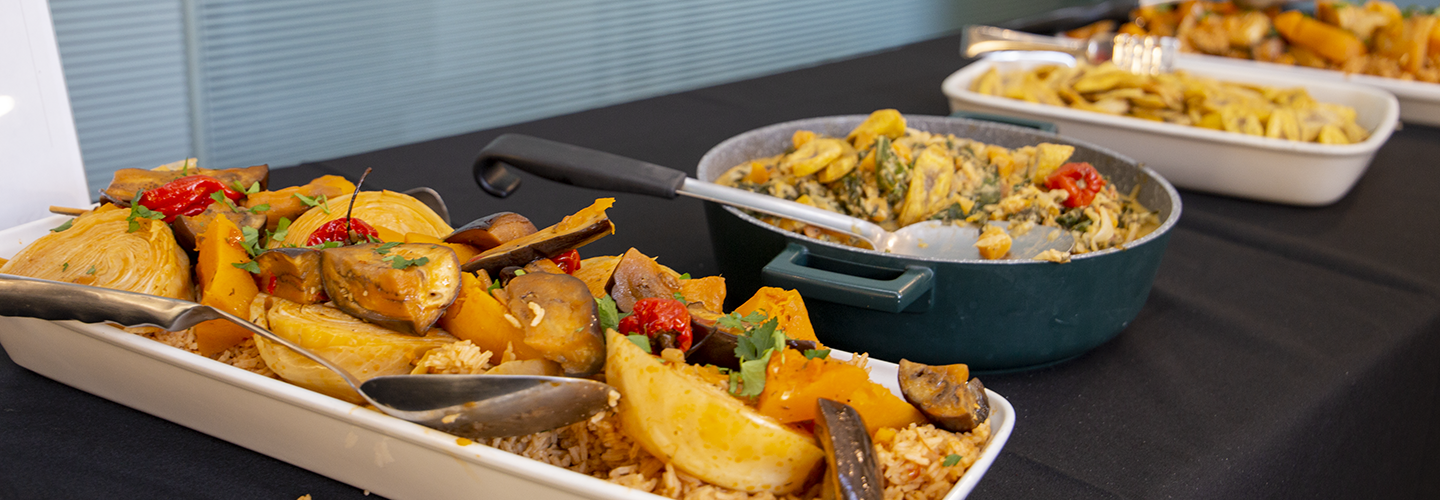The School of Health & Psychological Sciences and School of Policy & Global Affairs hosted a joint event exploring diet, nutrition and wellbeing in support of Black Futures Month.
By Mr Shamim Quadir (Senior Communications Officer), Published
On Monday 6 November, staff and students from the School of Policy & Global Affairs, and the School of Health & Psychological Sciences, descended upon a lunchtime event exploring the themes of diet, nutrition and wellbeing, particularly for those from African and Caribbean backgrounds.
Participants had the uniformly reported and absolute pleasure of sampling a range of healthy and authentic small bites made from African and Caribbean recipes, including: jerk chicken, jollof rice, plantain, puff puff, callaloo stew, mojito shrimps, sweet potato fritters (with pineapple and chilli mayo), and Jamaican veggie patties.

Anders Eklund, Executive Development Chef at Grayson’s, attended the event in person to ensure that the dishes his team had provided were delivered to the complete satisfaction of patrons and to his exacting standards. He also shared recipes from the day which many people took away.
Advice from the experts
The lip-smacking luncheon was followed by a series of talks delivered by academics from City’s Centre for Food Policy, where participants received culturally sensitive dietary advice, particularly targeted at people from African and Caribbean backgrounds.


Dr Swrajit Sarkar, Senior Lecturer in Nutrition at the Centre for Food Policy, provided examples of ways African and Caribbean foods, as well as foods from other communities, could be prepared more healthily. He said in part:
“No food is bad. Every food in moderation is good. However: reduce sugar, reduce fat, have more ‘resistant starch’. The first question the participants [in the study] had was, ‘What do you mean resistant starch? And you’re telling me to have brown rice? I’ve only had basmati rice my entire life, so what are you talking about?’ So, there’s a mismatch between what we’re asking people to do, versus what people can accept, adapt to and change.”
He later added:
“I’m not asking you to delete a food group at all, which is culturally appropriate, and you enjoy. Use smaller portions, smart portions, and to do that I’m going to show you really good help available. However, there is a gap between knowing where it is and how accessible it is to different ethnic groups… so healthier eating, African, Caribbean and South Asian cuisines – [here is] a guide [NHS Healthier You] – on how you can make it healthy, how you can eat healthily, and it’s developed by a nutritionist and a registered dietician.”

Samyat Kolawole, Research Assistant at the Centre for Food Policy, shared insights from a participatory research study into people’s lived experiences of dietary inequalities.
She described how policy can often take a top-down approach, whereby the people who will experience its ramifications are often not consulted in its design and implementation.
Samyat said in part:
“The Feeding Our Families study has explored the lived experiences of ten parents on low incomes. We have gained important insights into dietary inequalities through adopting a participatory approach. These insights may have been obscured if we had not worked with the parents in this way.
“From this work, we’ve learned how important it is to not only involve people with lived experience in research, but also in the process of designing and implementing interventions into eating practices. This is essential in order to develop policies, and interventions that are reflective of, and appropriate for, the specific needs of communities.”

Dr Rebecca Wells, Senior Lecturer at the Centre for Food Policy, provided the context of wider sustainability considerations that must be made for all diets, saying in part:
“Sustainability is one of the things that we’re thinking about in the Centre for Food Policy, for example, Tim Lang’s work on sustainable diets. So, how do we manage environmental and health concerns? If we’re going to be saying to people: you need to be eating two portions of oily fish a week, where is that fish coming from? We’ve got to manage the fish stocks, we’ve got environmental issues...
“..we’re thinking more about how can we make the advice that we’re giving not only culturally appropriate, but also sustainable at the same time. So it’s a really complicated jigsaw puzzle that we’re trying to solve!”


The importance of Black Futures events
Petros Iosifidis, Professor of Media & Communication Policy, School of Policy & Global Affairs chaired the session and co-organised the event. He said:
Michelle Ellis, Associate Dean for Equality, Diversity and Inclusion, School of Health & Psychological Sciences, who co-organised the event said:
Upcoming Equality Diversity & Inclusion (EDI) events
At the School of Policy & Global Affairs
Organiser: Professor Petros Iosifidis
Examining the inequalities of the gender and the partner pay gap
3–4pm, Tuesday 28 November, 2023
Speaker: Dr Vanessa Gash, Soc-Crim, SPGA
Location: D427 (4th floor, Rhind Building)
Why Economics Needs Women and Women Need Economics
3–4pm, Tuesday 5 December, 2023
Speaker: Dr Maria Psyllou, University of Birmingham
Location: D427 (4th floor, Rhind Building)
Anti-racism - Understanding and Addressing Micro-Aggressions
3-4pm, Wednesday 24 January, 2024
Speaker: Jill Scott, CEO/Managing Director, Flexible Work Solutions Limited and Inclusion Solutions Limited (online courses).
Location: D427 (4th floor, Rhind Building)
At the School of Health & Psychological Sciences
Organiser: Michelle Ellis
International Men’s Day – "Let's talk about suicide" - discussion exploring personal experiences of colleagues as clinicians working with clients with suicidal ideation.
12-1pm, Friday 17 November, 2023
Speakers: Simon Grist, Head of Nursing at City; Betsy Scott, Manager, East London NHS Foundation Trust (ELFT) Education Team
Location: AG01, College Building, or online.
(Un)Reasonable Adjustments: A student and staff discussion on disability access
12-2pm, Tuesday 5 December, 2023
Speakers: Group discussion
Location: ELG12, Drysdale Building
